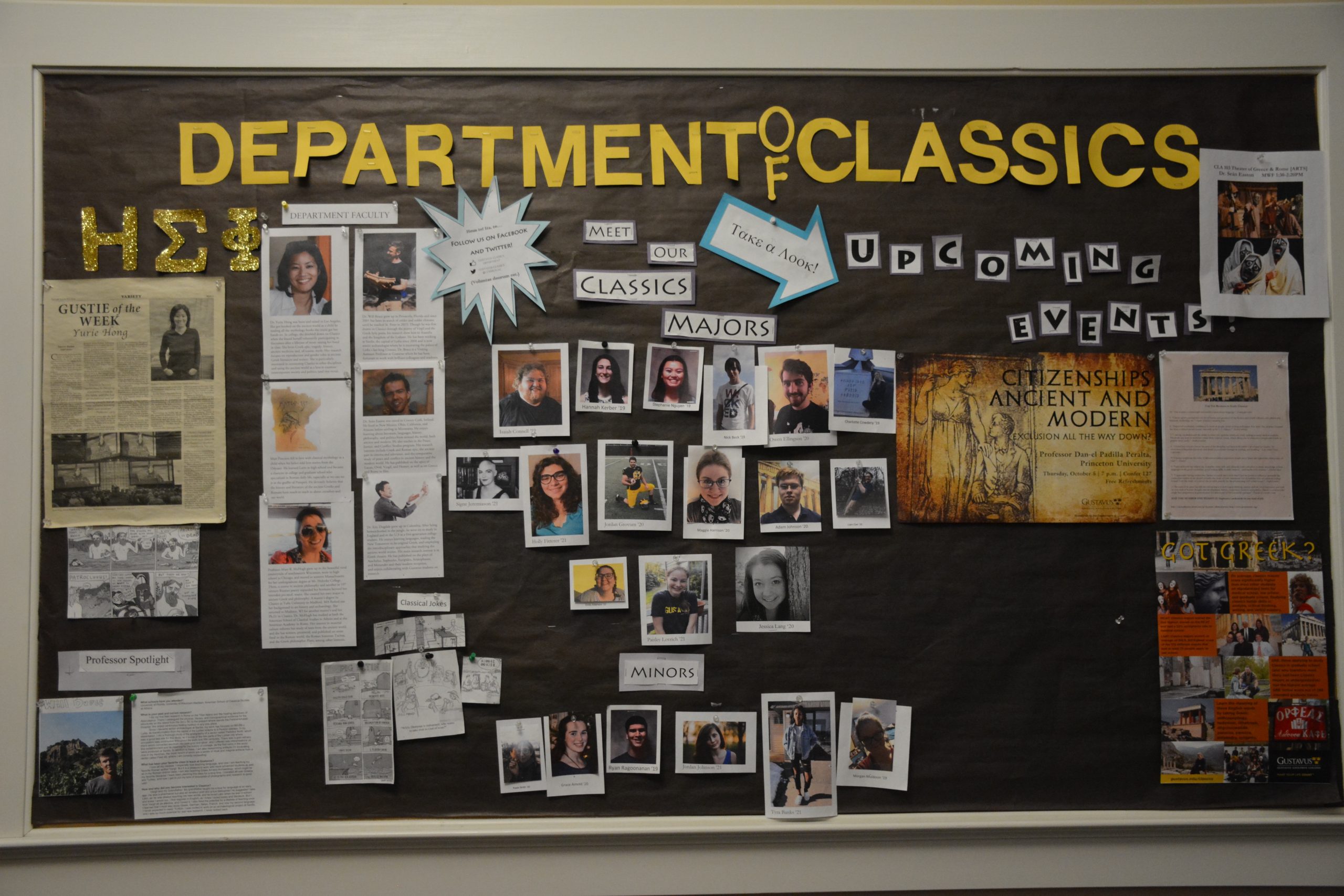The Gustavus Adolphus College faculty members are proudly and diligently working day by day to enrich and evolve their offering of majors and minors, from Physics to Communications Studies.
These majors have been parts of the Gustavus Curriculum since the beginning and they help maintain many different values at Gustavus.
When it comes to the humanities majors, the Classics claims an indispensable position.
“The purpose of our program is to introduce students to the many fascinating aspects of ancient Greek and Roman history, language, and culture. Students gain a broad, historical perspective from our courses and are able to place modern concepts, events, and issues into a broader cultural context,” Yurie Hong, Chair of Greek, Roman and Classical Studies said.
With the diverse topics that students can easily integrate into their daily experience, the Classics courses attract many Gusties.
“It’s cool to be able to connect your own experience and perspective with people from a very different time, place, and culture than your own.”
-Professor Yurie Hong
Among these courses is Myth and Meaning, one of the most popular courses that fulfill the Literary and Rhetorical Studies (LARS) general education credit. Myth and Meaning is an exciting introduction to an even much more exciting field of scholarly work–that of the classical studies.
Surveying the major gods and heroes of ancient Greek and Roman mythology, Myth and Meaning facilitates small group discussions among a large number of students.
One section of Myth and Meaning typically houses over seventy-five students sitting around the large lecture hall in the Confer-Vickner building. This setting resembles that of the ancient Greek theater, offering students the physical experience of the passing of ancient knowledge.
With equipped audio and sound systems, the classroom is always lively with discussions of mythology and especially how it serves as such a powerful medium carrying the evolving meanings and values throughout the history of humanity.
Those who further pursue the classical studies will have the opportunity to examine more closely topics with more specific focuses, ranging from courtroom oratory to ancient Greek athletics and medicine.
The class sizes also grow smaller as the levels of the courses increase. Gusties who would like to delve into such a broad field of study should consider exploring classes in the major.
Professor Hong noted the many benefits of studying the classics. “First of all, there’s just a lot of really interesting material and it’s cool to be able to connect your own experience and perspective with people from a very different time, place, and culture than your own. Secondly, because so many artists, writers, leaders, etc. explicitly make reference to ancient art, literature, concepts, etc., students with knowledge of ancient Greece and Rome means that students are able to gain a much deeper understanding of whatever it is they’re thinking about,” Professor Hong said.
Outside of the coursework, students of the classics immerse themselves in a wide variety of activities.
“Students have many opportunities to conduct research, travel abroad, participate in archaeological digs, and get funding to pursue their own independent projects through the Flory-Freiert Fellowship. We host a lot of fun events, as well, from barbecues at faculty members’ houses every semester, departmental teas, an annual Roman banquet, trips to the Cities to see ancient-themed plays, and movie and game nights,” Professor Hong said.
Professor Hong could not help but express her love for her student majors and describe them as “a great group of fun and intellectually curious students, who are engaged in many aspects of campus life. It’s a very tight knit group that hangs out together and supports one another. They’re great at drawing connections between their various passions, daily lives, and areas of study, and I think they’re pretty astute readers of modern culture and politics for all of these reasons”.
For those wondering the career possibilities, the Classics major will not disappoint them as this major trains and prepares its scholar in a myriad of ways and for a myriad of occupations.
“Knowledge of ancient languages and cultures provides students with the conceptual and analytical skills to succeed in a range of careers, including medicine, seminary, law, non-profit work, business, journalism, government work, basically any type of work you can think of,” Professor Hong said.
“It’s a very tight knit group that hangs out together and supports one another. They’re great at drawing connections between their various passions, daily lives, and areas of study, and I think they’re pretty astute readers of modern culture and politics for all of these reasons.”
-Professor Yurie Hong
Last but not least, the Department of Greek, Latin, and Classical Studies, formerly known as the Department of Classics, are going through radical changes to open the program’s access to more students.
“There are a lot of exciting changes afoot in our department that we hope will make it easier for students to find and engage with our major. For example, we’ve changed our name to “Department of Greek, Latin, and Classical Studies” so it will be clearer what we’re about, and we’ve introduced a new major: Ancient Greek Studies, which only requires 3 semesters of language but emphasizes courses in English, to make our major even more accessible to all students. Finally, we’ve revamped almost all of our classes to provide more opportunities for students to think about the diversity and relevance of the ancient world to today, such as ‘Democracy: Then and Now’, ‘Daily Life in Rome and Pompeii,’ ‘Greece and Rome On Screen,’ and ‘Ancient and Modern Identities.’ We’re really excited about these changes and know that there’s something that will be of interest to any student across campus,” Professor Hong said.
